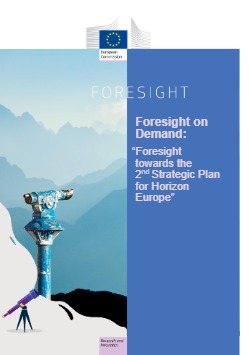Last Edited: a year ago
Foresight on Demand: “Foresight towards the 2nd Strategic Plan for Horizon Europe”July 2023
This is the final report from a foresight study that aimed at supporting the development of the Strategic Plan of Horizon Europe (2025-2027). The study lasted for 18 months and involved a wide range of activities that this report aims at presenting.
These activities aimed at providing early-stage strategic intelligence and sense-making contributions – issues, trends, perspectives, ideas - that could contribute novel elements to the more structured processes of strategic planning that were to follow. The work followed two important directions that were recommended by EFFLA (2012)1 as core elements of bringing foresight into EU R&I policy: knowledge-based review and broad engagement.
Knowledge based review was conducted with the help of the 40 experts who constituted the team that worked on the project. All these experts have contributed as authors to the authorship of the different chapters of this report. About 300 additional experts contributed to the project through its numerous workshops that helped shape the scenarios and ideas about their policy implications, and through membership in the on-line platform of the project at www.futures4europe.eu, which reached 307 people. Last, we acknowledge the 943 experts who responded to our final consultation survey on the implications of our foresight for the directions of EU R&I policy.
The foresight process
The foresight process in support of the 2nd Strategic Plan comprised a wide spectrum of activities:
• As a reference point for the exploratory work, the explicit and implicit impact assumptions of the 1st Strategic Plan were identified and visualised with the help of a qualitative system analysis and modelling tool for causal loop analysis.
• An exploratory analysis of forward-looking sources (e.g. foresight reports, web-based horizon scanning) was conducted to identify relevant trends and signals of unexpected developments. These were discussed in online workshops and on www.futures4europe.eu.
• An outlook on emerging developments in the global and European context of EU R&I policy was developed drawing on a major online workshop in autumn 2021 with some 60 participants, experts and policy makers, who worked with multi-level context scenarios and specific context narratives about emerging disruptions.
• On that basis and in close consultation with the European Commission involving another major workshop in February 2022 which brought together 80 participants, Expert Teams were set up to develop disruptive scenarios in five areas of major interest. Each team ran several internal workshops but also involved further experts and Commission staff in their work, both through the online platform and through a final policy-oriented workshop. The foresight work within the areas of interest resulted in five deep dives on the following topics:
> Climate change, Research, and Innovation: Radical Options from Social Change to Geoengineering
> Hydrogen Economy – A radical alternative
> The EU in a Volatile New World - The challenge of global leadership
> Global Commons
> Transhumanist Revolutions
• Further areas of interest identified since were explored through review papers aiming to capture major trends, developments and scenario sketches in relation to further disruptive developments
> Social Confrontations
> Artificial General Intelligence: Issues and Opportunities
> The Interpenetration of Criminal and Lawful Economic Activities
> The Future of Health
• A third major workshop took place in October 2022 bringing together all the thematic strands of work and addressing possible R&I policy implications from this work. Participation in this workshop reached 250 individuals over 2 days.
• Building on the workshop, the online Dynamic Argumentative Delphi survey Research4Futures collect suggestions from further experts and citizens about the implications of this foresight work for the priorities of EU R&I policy.
This foresight study has been the most widely engaging foresight exercise yet aiming to support EU R&I policy. Through this broad engagement, the study did not only develop intelligence for the 2nd Strategic Plan of Horizon Europe but also contributed to the development of an EU R&I foresight community, one that is an asset for future R&I policies across Europe.
Posted on: 30/11/2024






